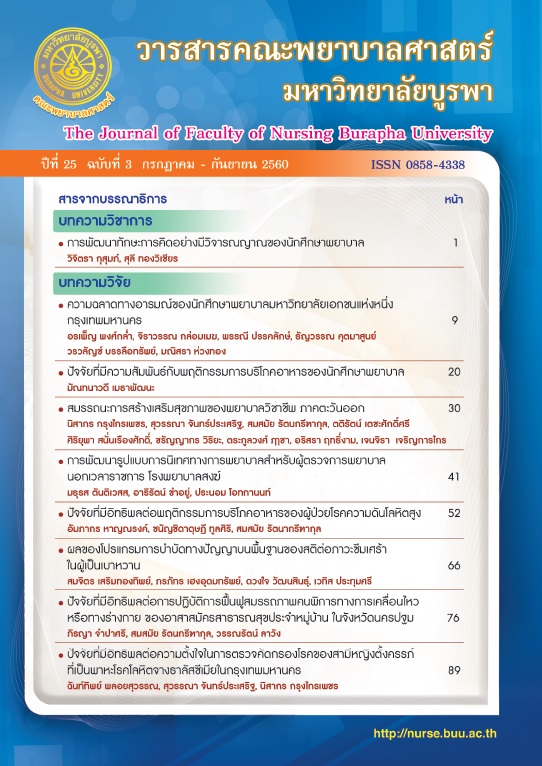ปัจจัยที่มีความสัมพันธ์กับพฤติกรรมการบริโภคอาหารของนักศึกษาพยาบาล
คำสำคัญ:
พฤติกรรมการบริโภคอาหาร, นักศึกษาพยาบาล, ความรู้ทางโภชนาการ, Food consumption behavior, nursing students, nutritional knowledgeบทคัดย่อ
การวิจัยครั้งนี้เป็นการวิจัยแบบบรรยายเชิงหาความสัมพันธ์โดยมีวัตถุประสงค์เพื่อศึกษาปัจจัยที่มีความสัมพันธ์กับพฤติกรรมการบริโภคอาหารของนักศึกษาพยาบาล โดยนำแนวคิดการส่งเสริมสุขภาพของเพนเดอร์มาเป็นกรอบแนวคิดในการศึกษาครั้งนี้ กลุ่มตัวอย่างคัดเลือกแบบสะดวกคือนักศึกษา จำนวน 474 คน ที่กำลังศึกษาในวิทยาลัยพยาบาลแห่งหนึ่งในกรุงเทพมหานคร เครื่องมือวิจัยเป็นแบบสอบถามที่ให้กลุ่มตัวอย่างเป็นผู้ตอบเอง จำนวน 3 ชุดประกอบด้วย แบบสอบถามข้อมูลทั่วไป แบบสอบถามพฤติกรรมการบริโภคอาหาร และแบบสอบถามความรู้ทางโภชนาการ มีค่าความเชื่อมั่นเท่ากับ .62 และ .76 ตามลำดับ เก็บรวบรวมข้อมูลในปี 2560 วิเคราะห์ข้อมูลโดยใช้สถิติพรรณนา และค่าสัมประสิทธิ์สหสัมพันธ์ของเพียร์สัน ผลการศึกษาพบว่า ค่าเฉลี่ยของคะแนนพฤติกรรมการบริโภคอาหารอยู่ในระดับดี คิดเป็นร้อยละ 65.20 ชั้นปีที่ศึกษา ความรู้ทางโภชนาการ และค่าใช้จ่ายที่ได้รับจากผู้ปกครองมีความสัมพันธ์ทางบวกกับพฤติกรรมการบริโภคอาหารของนักศึกษาพยาบาล (r=.77, p<.001, r=.18, p<.001 และ r=.13, p<.01 ตามลำดับ) เพศและเกรดเฉลี่ยสะสมไม่พบมีความสัมพันธ์กับพฤติกรรมการบริโภคอาหาร (p>.05) ผลการวิจัยนี้ให้ข้อเสนอแนะว่า อาจารย์และผู้บริหารสถาบันพยาบาลควรส่งเสริมและสนับสนุนการสร้างเสริมพฤติกรรมบริโภคอาหารแก่นักศึกษาพยาบาลโดยเน้นการเพิ่มความรู้ทางโภชนาการ
Abstract
This correlational descriptive study aimed to examine factors related to food consumption behavior of nursing students. The Health Promoting Model was guided the study. A convenience sampling was used to recruit a sample of 474 students studying in a nursing college in Bangkok. Research instruments included 3 self-report questionnaires of a demographic information, the food consumption behavior questionnaire and the nutritional knowledge questionnaire with their reliability of .62 and .76, respectively. Data collection was carried out in 2017. Descriptive statistics and Pearson correlation coefficients were used to analyzed the data. Results indicated that mean total score of food consumption behavior was at a good level which was 65.20%. Year of study, nutritional knowledge and expenses receiving from parents were positively correlated with food consumption behavior (r=.77, p<.001, r=.18, p<.001 and r=.13, p<.01, respectively). Gender and Grade Point Average were found no relationship with food consumption behavior (p>.05). These findings suggest that instructors and administrators in nursing institutes should encourage and support food consumption behavior among nursing students by focusing on increasing nutritional knowledge.





